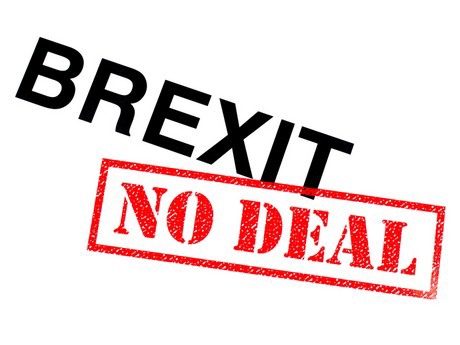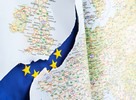Prime Minister Theresa May suffered a defeat yesterday in British Parliament. A clear majority of 432 votes were cast against her proposal. May’s plan had the support of 202 MPs. One thing is now clear: uncertainty prevails. What will the consequences for the horticultural industry?

Beneficials & bumblebees
"We've ta lked the various scenarios through, we've analyzed the risks - but so far we don't know anything yet", Jan Schuttrups, director with Royal Brinkman International, summarises. "In case of a no-deal scenario, we will have to follow the export rules and that's something we can work with. We know how to export, how to deal with the right documentation. Since we operate worldwide and import from various countries including the UK, that's not the challenge."
lked the various scenarios through, we've analyzed the risks - but so far we don't know anything yet", Jan Schuttrups, director with Royal Brinkman International, summarises. "In case of a no-deal scenario, we will have to follow the export rules and that's something we can work with. We know how to export, how to deal with the right documentation. Since we operate worldwide and import from various countries including the UK, that's not the challenge."
Customs and phytosanitary services are a bigger challenge. "Traffic at the border or long waiting times might make it more difficult for us to import our products. We will increase local stocks and deliver more from our UK location to cope with this."
A post-Brexit challenge to the company could be the devaluation of the Pound. "In that case all import products will become more expensive. Some horticultural supplies are produced locally, but various grower necessities are imported. If the prices are to rise, they might look into local alternatives."
More serious issues could occur in biological crop protection. Many beneficial insects have to be transported in a conditioned manner and delivered within a certain period of time. Additional checks and long queues can disrupt this. "Some beneficials have to be delivered within a day, where others can remain unattached for a week or so. But in the worst case scenario, growers would have to switch back to chemicals."
Moreover, at the end of March - Brexit time - the strawberries are to be pollinated. "You can pollinate tomato plants by hand, but bumblebees are necessary in the pollination of strawberries. Therefore our biggest worry is capacity problems and long waiting times at customs or phytosanitary services."
"We're still gazing in a crystal ball"
" How are we supposed to know what will happen if they don't know it themselves?" John Meijer with Bom Group summarises the situation. Bom Group supplies high-tech horticulture projects worldwide. "We have quite a few big deals coming up in the UK and created pre- and post-Brexit clauses. That way we're trying to prepare. For now it remains uncertain what the future will bring, especially for the greenhouses we're exporting."
How are we supposed to know what will happen if they don't know it themselves?" John Meijer with Bom Group summarises the situation. Bom Group supplies high-tech horticulture projects worldwide. "We have quite a few big deals coming up in the UK and created pre- and post-Brexit clauses. That way we're trying to prepare. For now it remains uncertain what the future will bring, especially for the greenhouses we're exporting."
He continues: "If there will be a trade agreement, the UK will be a 'third country' in terms of exporting. We do business with many similar 'third countries' and will just have to see what terms are needed to import all products. Like all greenhouse builders, we import parts like steel and aluminum to the UK, as well as glass from inside and outside Europe. Getting the paperwork done should not be a problem. But of course there's more to it. We are based in the Hook of Holland and can see the ferries departing to England from our office. One wonders what will happen after the 29th. Traffic jams and waiting for hours for custom service, or even having to wait for months to get access to a boat? Those developments will affect us directly and will affect our clients, since they're active in the production and trade of fresh fruit and vegetables. But it's not just us - it's the complete Dutch export industry."
Since Brexit was announced, UK demand for greenhouse projects has risen. "The demand can't be compared to the explosive increase we saw after the Russian boycott, but we do notice how investors and companies see opportunities to increase the local production. Brexit is stimulating that."
Will it also stimulate local competitors in the greenhouse construction market? Probably not, John explains. "The Dutch horticultural suppliers are known worldwide, and our customer relationships have a long history. Since knowledge and technique are inseparable in our industry, a local party can step in, but they cannot offer the same level of knowledge. The expertise from seed to supermarket is unique for the Dutch suppliers and is not to be replaced easily."
All in all, Bom Group will keep following the news but isn't really stressed about the Brexit - even though the UK is in their top 10 of export countries. "It is what you deal with when exporting. There's always something going on somewhere. We've seen it before. Is it difficult? Yes. Will it cost us some? Yes. But in the end, we'll figure it out."
Expensive lettuce A head of lettuce could become 10.4% more expensive with a no-deal Brexit, according to calculations done by ABN AMRO in their report “Disorderly Brexit, consequences for the Dutch business community”.
A head of lettuce could become 10.4% more expensive with a no-deal Brexit, according to calculations done by ABN AMRO in their report “Disorderly Brexit, consequences for the Dutch business community”.
A total of 12 percent of all Dutch fruit exports go to Great Britain. Moreover, import duties from the World Trade Organization (WTO) automatically apply to a no-deal Brexit. For example, a head of lettuce will be 10.4 percent more expensive due to import tariffs.
The UK is the third export market for the Netherlands after Germany and Belgium. Conversely, the Netherlands is the fourth export market for the UK. For Dutch importers of goods produced in the UK a hard Brexit will have the adverse effect that the product liability shifts to the importer, since the British producer is no longer a resident of the EU. Exporters are then faced with two customs: the Dutch and the British.
Even for companies that don't deal directly with the UK, a hard Brexit can turn negative. Suppliers of these companies may have trade links with the UK. This can lead to longer delivery times and higher prices of the goods to be delivered.
According to the bank, the most vulnerable of all sectors is Transport & Logistics. Transport companies are faced with extra administrative red tape in the event of a hard Brexit. At present, two or three documents are required for export to the UK according to Dutch customs. That will increase to at least seven. A hard Brexit also means the return of border controls. An average ferry contains 5.5 kilometers of trucks, 300 passenger cars and 1,200 passengers. The queues that can arise are a major risk for carriers of perishable goods and for just-in-time deliveries.
Fresh produce Then there’s the fresh produce trade. Dutch trading company Valstar has been preparing severely for the last two years. “We’ve based this on the worst-case scenario of a hard Brexit, and while many people say it’s difficult to prepare, it’s what we’ve been working on for almost two years. However, lately there’s more talk about a ‘chaotic’ hard Brexit. That’s what worries me most”, Edwin Vanlaerhoven, director of Valstar, says. "We are dealing with Britons and I do not think they are well prepared. Many conversations are about politics, not about concrete solutions. I would like to hear how they take care of things like sufficient parking places, customs officers and workable control systems. That’s what worries me most."
Then there’s the fresh produce trade. Dutch trading company Valstar has been preparing severely for the last two years. “We’ve based this on the worst-case scenario of a hard Brexit, and while many people say it’s difficult to prepare, it’s what we’ve been working on for almost two years. However, lately there’s more talk about a ‘chaotic’ hard Brexit. That’s what worries me most”, Edwin Vanlaerhoven, director of Valstar, says. "We are dealing with Britons and I do not think they are well prepared. Many conversations are about politics, not about concrete solutions. I would like to hear how they take care of things like sufficient parking places, customs officers and workable control systems. That’s what worries me most."
He continues: "I still sincerely hope that the Brexit will be cancelled completely, but for the time being we focus on a hard Brexit, in which the United Kingdom departs from the EU without any rules and becomes a ‘third country' for us. We have experience with export to third countries, but the chaos and awareness amongst our customers is what truly worries me. I am usually very optimistic and I see opportunities everywhere, but in this case it seems to me very important that realism predominates", Edwin concludes.
Fountain Fresh
Jack Hanson from Fountain Fresh who imports a lot of produce from Europe, including salads and citrus said customers have been calling asking what the tariffs will be and just what will happen in the trade.
"People have been asking if we have contingency plans, I have heard that some big companies have hired people to make these plans, but it is difficult to plan for such an unknown, we have done as much as we can.
"The only scenario I can see happening is similar to what happens when you import from outside the EU, where you have a tax and clearance documents and declare the goods. This system works for goods from the Southern Hemisphere because you are bringing in full containers or full loads and it is quite straight forward, but European imports from Spain are very sporadic, lots of trucks, lots of different products and it's not as structured as containers, so just because that system works for containers doesn’t necessarily means it is going be easy for Spanish importers.
"I just hope that they will take a view on particular areas, one of which is fresh produce which needs to be given a president to get through, we can’t just have thousands of trucks waiting to get through because they can’t cross the border because the paperwork is not done."
No-deal increasingly likely
In response to the vote against the Prime Minister’s Withdrawal Agreement last night, NFU President Minette Batters said: “As a result of the vote in the House of Commons, the country now finds itself in a situation where a no-deal Brexit appears to be increasingly likely. I have been clear that such an exit would simply be catastrophic for Britain and its food and farming sector and the country’s ability to produce home-grown food.
response to the vote against the Prime Minister’s Withdrawal Agreement last night, NFU President Minette Batters said: “As a result of the vote in the House of Commons, the country now finds itself in a situation where a no-deal Brexit appears to be increasingly likely. I have been clear that such an exit would simply be catastrophic for Britain and its food and farming sector and the country’s ability to produce home-grown food.
“A no-deal Brexit has to be avoided at all costs. The NFU has been clear that reaching a Brexit deal is a priority and we will be assessing any deal against our six key principles agreed at an Extraordinary meeting of the NFU’s Council in December, which includes avoiding a no-deal and ensuring free and frictionless trade with our biggest trading partner.
“The NFU is at the forefront of our industry coming together to warn against a no-deal outcome and we remain committed to playing our part in representing British farmers and growers throughout this process, ensuring their voice is heard across Parliament.
“I urge the Government to take all the necessary steps to achieve a deal with the EU that delivers on these principles.”
LTO
Dutch agricultural organis ation LTO also emphasises the importance of trade. Dutch farmers and market gardeners are becoming more worried, according to the organisation. The UK is their third sales market, good for eight billion euro in agricultural and horticultural products. “It’s therefore crucial that trade continues unhindered after 29 March as well,” according to LTO. “LTO Netherlands stresses the importance of being properly prepared among its members, but also expects the Dutch government to offer practical solutions.”
ation LTO also emphasises the importance of trade. Dutch farmers and market gardeners are becoming more worried, according to the organisation. The UK is their third sales market, good for eight billion euro in agricultural and horticultural products. “It’s therefore crucial that trade continues unhindered after 29 March as well,” according to LTO. “LTO Netherlands stresses the importance of being properly prepared among its members, but also expects the Dutch government to offer practical solutions.”
Although the sector is preparing for Brexit and agreements are being made among companies to spread the pain across the supply chain, LTO stresses that the sector can’t do this on its own. “A hard Brexit isn’t a normal risk of being an entrepreneur.” LTO Netherlands calls on the government to do everything possible to minimise delays at the border should a no-deal Brexit come into effect.
“We have to prevent uncertainty from turning into chaos. Fresh products like tulips or tomatoes can’t be halted for a day at the border The agrarian sector is preparing for that, but the Cabinet should also be ready. If all costs are shifted to the individual farmers and market gardeners, businesses will collapse,” says Marc Calon, chairperson of LTO Netherlands.
To help companies faced with the major consequences of Brexit, LTO pleads for using the budget reserved by the government to prepare for Brexit. This concerns 651 million euro reserved for this goal by the Cabinet in its interim budget report for the 2018-2023 period.
And now what?
Right after the results came in, opposition leader Jeremy Corbyn submitted a motion of no-confidence. This will be debated and voted on today. If PM May survives the vote, she’ll have three days to put forward a new Brexit proposal. If the PM loses the confidence of Parliament, the government will collapse and new elections will follow. Regarding Brexit, there are multiple scenarios: a new. agreement with the EU, a second referendum, or a delayed Brexit. Officially, the UK leaves the EU on 29 March. That’s 72 days from today
Read responses from the floricultural industry at FloralDaily.com
